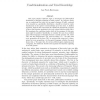Free Online Productivity Tools
i2Speak
i2Symbol
i2OCR
iTex2Img
iWeb2Print
iWeb2Shot
i2Type
iPdf2Split
iPdf2Merge
i2Bopomofo
i2Arabic
i2Style
i2Image
i2PDF
iLatex2Rtf
Sci2ools
122
click to vote
JANCL
2008
2008
Conditionalization and total knowledge
This paper employs epistemic logic to investigate the philosophical foundations of Bayesian updating in belief revision. By Bayesian updating, we understand the tenet that an agent's degrees of belief--assumed to be encoded as a probability distribution--should be revised by conditionalization on the agent's total knowledge up to that time. A familiar argument, based on the construction of a diachronic Dutch book, purports to show that Bayesian updating is the only rational belief-revision policy. We investigate the conditions under which of the premises of this argument might be satisfied. Specifically, we consider the case of an artificial agent whose language (of thought) features a modal operator TK, where TK has the interpretation "My total knowledge is ". We show that every proposition of the form TK is epistemically categorical: it determines, for every proposition in the agent's language, whether the agent knows that . We argue that, for certain artif...
Related Content
| Added | 12 Dec 2010 |
| Updated | 12 Dec 2010 |
| Type | Journal |
| Year | 2008 |
| Where | JANCL |
| Authors | Ian Pratt-Hartmann |
Comments (0)

